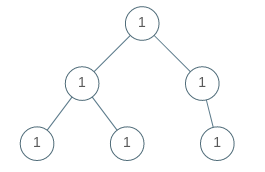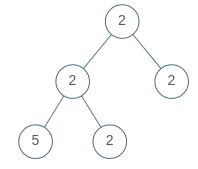965. Univalued Binary Tree
Description
A binary tree is uni-valued if every node in the tree has the same value.
Given the root of a binary tree, return true if the given tree is uni-valued, or false otherwise.
Example 1:

Input: root = [1,1,1,1,1,null,1] Output: true
Example 2:

Input: root = [2,2,2,5,2] Output: false
Constraints:
- The number of nodes in the tree is in the range
[1, 100]. 0 <= Node.val < 100
Solutions
Solution 1: DFS
We denote the value of the root node as $x$, and then design a function $\text{dfs}(\text{root})$, which indicates whether the current node's value is equal to $x$ and its left and right subtrees are also univalued binary trees.
In the function $\text{dfs}(\text{root})$, if the current node is null, return $\text{true}$; otherwise, if the current node's value is equal to $x$ and its left and right subtrees are also univalued binary trees, return $\text{true}$; otherwise, return $\text{false}$.
In the main function, we call $\text{dfs}(\text{root})$ and return the result.
The time complexity is $O(n)$, and the space complexity is $O(n)$, where $n$ is the number of nodes in the tree.
Python3
# Definition for a binary tree node.
# class TreeNode:
# def __init__(self, val=0, left=None, right=None):
# self.val = val
# self.left = left
# self.right = right
class Solution:
def isUnivalTree(self, root: Optional[TreeNode]) -> bool:
def dfs(root: Optional[TreeNode]) -> bool:
if root is None:
return True
return root.val == x and dfs(root.left) and dfs(root.right)
x = root.val
return dfs(root)
Java
/**
* Definition for a binary tree node.
* public class TreeNode {
* int val;
* TreeNode left;
* TreeNode right;
* TreeNode() {}
* TreeNode(int val) { this.val = val; }
* TreeNode(int val, TreeNode left, TreeNode right) {
* this.val = val;
* this.left = left;
* this.right = right;
* }
* }
*/
class Solution {
private int x;
public boolean isUnivalTree(TreeNode root) {
x = root.val;
return dfs(root);
}
private boolean dfs(TreeNode root) {
if (root == null) {
return true;
}
return root.val == x && dfs(root.left) && dfs(root.right);
}
}
C++
/**
* Definition for a binary tree node.
* struct TreeNode {
* int val;
* TreeNode *left;
* TreeNode *right;
* TreeNode() : val(0), left(nullptr), right(nullptr) {}
* TreeNode(int x) : val(x), left(nullptr), right(nullptr) {}
* TreeNode(int x, TreeNode *left, TreeNode *right) : val(x), left(left), right(right) {}
* };
*/
class Solution {
public:
bool isUnivalTree(TreeNode* root) {
int x = root->val;
auto dfs = [&](this auto&& dfs, TreeNode* root) -> bool {
if (!root) {
return true;
}
return root->val == x && dfs(root->left) && dfs(root->right);
};
return dfs(root);
}
};
Go
/**
* Definition for a binary tree node.
* type TreeNode struct {
* Val int
* Left *TreeNode
* Right *TreeNode
* }
*/
func isUnivalTree(root *TreeNode) bool {
x := root.Val
var dfs func(*TreeNode) bool
dfs = func(root *TreeNode) bool {
if root == nil {
return true
}
return root.Val == x && dfs(root.Left) && dfs(root.Right)
}
return dfs(root)
}
TypeScript
/**
* Definition for a binary tree node.
* class TreeNode {
* val: number
* left: TreeNode | null
* right: TreeNode | null
* constructor(val?: number, left?: TreeNode | null, right?: TreeNode | null) {
* this.val = (val===undefined ? 0 : val)
* this.left = (left===undefined ? null : left)
* this.right = (right===undefined ? null : right)
* }
* }
*/
function isUnivalTree(root: TreeNode | null): boolean {
const x = root!.val;
const dfs = (root: TreeNode | null): boolean => {
if (!root) {
return true;
}
return root.val === x && dfs(root.left) && dfs(root.right);
};
return dfs(root);
}
Rust
// Definition for a binary tree node.
// #[derive(Debug, PartialEq, Eq)]
// pub struct TreeNode {
// pub val: i32,
// pub left: Option<Rc<RefCell<TreeNode>>>,
// pub right: Option<Rc<RefCell<TreeNode>>>,
// }
//
// impl TreeNode {
// #[inline]
// pub fn new(val: i32) -> Self {
// TreeNode {
// val,
// left: None,
// right: None
// }
// }
// }
use std::cell::RefCell;
use std::rc::Rc;
impl Solution {
pub fn is_unival_tree(root: Option<Rc<RefCell<TreeNode>>>) -> bool {
let x = root.as_ref().unwrap().borrow().val;
fn dfs(node: Option<Rc<RefCell<TreeNode>>>, x: i32) -> bool {
if let Some(n) = node {
let n = n.borrow();
n.val == x && dfs(n.left.clone(), x) && dfs(n.right.clone(), x)
} else {
true
}
}
dfs(root, x)
}
}